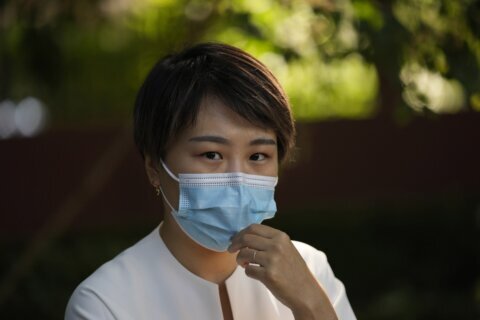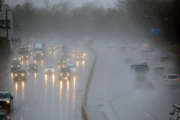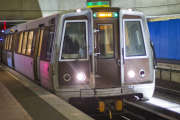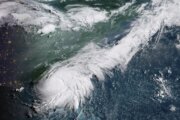CARACAS, Venezuela (AP) — The last time anyone heard from Edni López was Sunday. The 33-year-old political science professor was preparing to board a flight to Argentina to visit a friend when she texted from the airport just before 10 a.m. that something was wrong with her passport.
What happened next remains a mystery — one contributing to the climate of fear and repression that has engulfed Venezuela following its disputed presidential election, the most serious wave of human rights abuses since Latin America’s military dictatorships in the 1970s.
When López’s mother, Ninoska Barrios, and her friends learned she didn’t board the flight, they started frantically combing detention centers. Finally, on Tuesday — more than 48 hours later — they learned she was being held, incommunicado, by Venezuela’s feared military intelligence police on unknown criminal charges, unable to see an attorney or speak with her family.
“Please, give back my daughter,” a sobbing Barrios pleaded Tuesday outside Venezuela’s top human rights office in a video that went viral on social media. “It’s not right that a Venezuelan mother has to go through all this.”
Here are some of the takeaways from the AP’s exclusive report on López’s arrest and President Nicolás Maduro’s efforts to crush dissent.
How bad is the crackdown?
López’s arrest isn’t unique. Since the July 28 presidential election, security forces have rounded up more than 2,000 people for demonstrating against Maduro or casting doubt on his claims that he won a third term despite strong evidence he lost the vote by a more than 2-to-1 margin.
The spree of detentions — urged on by Maduro himself — is unprecedented and puts Venezuela on pace to easily exceed those jailed during three previous crackdowns against Maduro’s opponents.
Those arrested include journalists, political leaders, campaign staffers and an attorney defending protesters. Others have had their Venezuelan passports annulled. One local activist even livestreamed her own arrest by military intelligence officers as they broke into her home.
The repression, much of it seemingly random and arbitrary, is having a chilling effect, said Phil Gunson, a Caracas-based analyst for the International Crisis Group.
“It’s not just discouraging protests. People are scared to go on the streets period,” he said. “There’s a sense that police have a quota to fill and anyone can be stopped and carted away as a suspected subversive.”
What does Maduro say?
The threats start at the top. Maduro has called on Venezuelans to denounce election doubters via a government-run app originally created to report power outages. He also said the government was refurbishing two gang-dominated prisons to accommodate an expected surge in jailing of opponents.
“There will be no mercy,” Maduro said on state TV.
But complicating efforts to crush dissent is the changing face of the government’s opponents.
While demonstrations have been far smaller and tamer than past bouts of unrest, they’re now more spontaneous, often leaderless and made up of youth — some barely teenagers — from Caracas’ hillside slums who have traditionally been a rock solid base of support for the government.
Is the repression succeeding?
The swiftness of the government’s clampdown is staggering. In just 10 days, security forces have rounded up nearly the same number of people as they did over five months in 2017, according to Provea, a local human rights watchdog.
“Operation Knock-Knock is a prime tool of state terrorism,” said Oscar Murillo, the head of Provea, referring to the middle-of-the-night detentions touted as a scare tactic by officials.
In the low-income Caracas neighborhood of Catia, once a ruling party stronghold, residents are even deleting videos of the demonstrations from their smartphones for fear the government is tracking social media posts to identify critics.
The sudden silence is a sharp break from the hopeful mood preceding the election when emboldened opposition supporters confronted security forces at anti-Maduro rallies. They served food, lent their vehicles and opened their businesses to opposition leaders knowing they would suffer retaliation from the police or see their businesses shut down.
What is Venezuela’s human rights record?
Even before the current wave of unrest, Venezuela’s human rights record was under intense scrutiny. Maduro is himself the target of an investigation by the International Criminal Court for crimes against humanity allegedly committed in the past.
Maduro’s tactics have been likened to those used in Central and South America in the 1970s by military dictatorships that forcibly disappeared opponents and sometimes innocent bystanders. Many were killed, and in Argentina, some even drugged and dropped from airplanes into the ocean, with no trace of ever having been detained.
Maduro’s alleged abuses have little in common with those “Dirty War” campaigns carried out by state security forces.
But the goal of instilling fear is the same, said Santiago Canton, an Argentine lawyer and secretary general of the Geneva-based International Commission of Jurists, a watchdog group.
“What happened 50 years ago is unlikely to occur again,” said Canton. “But social media is a multiplier factor that didn’t exist before so you can be more selective with the use of force and achieve the same results.”
___
Goodman reported from Miami.
Copyright © 2024 The Associated Press. All rights reserved. This material may not be published, broadcast, written or redistributed.







